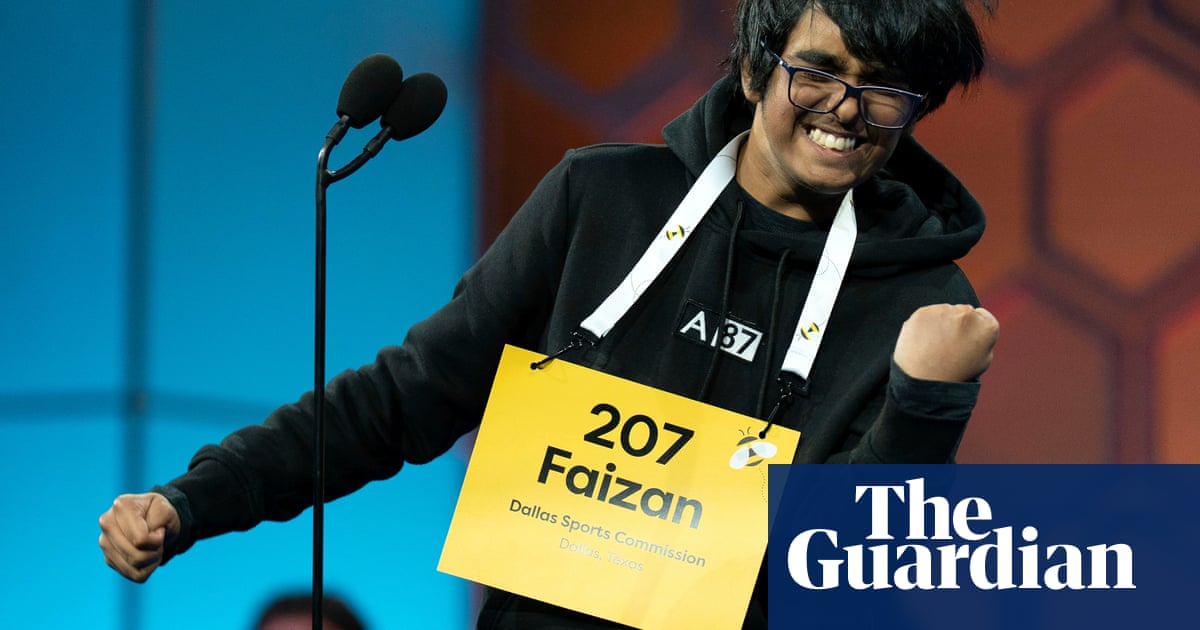With the benefit of hindsight, Vikram Raju knows there was almost no chance he would win after finishing as runner-up in the 2022 ScrippsNational Spelling Bee.
“The chances of getting that high are infinitesimally small, and the chances of doing it again are an order of magnitude smaller, obviously,” Vikram said Wednesday. “So it’s a really daunting feeling as well because you always try to outdo yourself from the previous year.”
Don’t tell Faizan Zaki those odds.
Faizan, who lost to Bruhat Somain a “spell-off” tiebreaker last year, was the only speller to earn a perfect score on the written spelling and vocabulary test that determined this year’s quarter-finalists. Then he breezed through seven rounds on Wednesday to become one of nine spellers who will compete in Thursday night’s finals for a trophy and more than $50,000 in cash and prizes.
And he’s done it all with insouciant flair, sauntering to the microphone in a black hoodie, shaggy hair in his face. Once he’s sure of the word, he takes his hands out of his sweatshirt pouch and matter-of-factly says each letter while he mimics typing in the air.
The 13-year-old from Allen, Texas, finally showed a bit of vulnerability on “coterell”, the word that got him to the finals, and he celebrated with a big fist pump after racing through its eight letters.
“It was just very relieving. I have a lot of expectations put on me, so I’m just excited that I’m going to the finals again,” Faizan said.
No matter how often he flexes his knowledge of roots and unfamiliar language patterns, historical trends suggest Faizan is an underdog. In 96 bees over 100 years, only four runners-up have later gone on to win, and just has done so in the last 44 years: Sean Conley, the 2001 champion who finished second the year before.
“Hopefully I can get it done,” Faizan said. “Especially back home, all of my friends, they tell me that I need to win this year.”
Disappointment has taken many forms for recent runners-up.
Naysa Modi, who finished second in 2018, was eliminated in 2019 by a written test that winnowed the field to 50 spellers, only to watch in dismay as the beedeclared eight co-championswho aced words that she also knew.
Simone Kaplan, the runner-up to those 2019 “octo-champs”, didn’t get a chance to come back because the 2020 bee was canceled due to Covid-19.
Chaitra Thummala, runner-upto Zaila Avant-garde in 2021, never contended again, even though she had two more years before she aged out of the competition. Spellers can’t be older than 15 or past the eighth grade.
Then came Vikram, who didn’t make it back in 2023 after a regional bee in Denver that lasted 53 rounds over a span of more than five hours. Vikram and his parents unsuccessfully appealed to Scripps that he misspelled because the bee’s pronouncer made one of several mistakes.
Now 15, Vikram returned to the bee to support his younger brother, Ved – who bowed out in the semi-finals – and he’s long past any bitter feelings about how his spelling career ended.
“Even if you know every single word in the dictionary, there are just factors that are completely out of your control,” Vikram said. “The nerves might get too big someday. Maybe the audience is distracting you in that one moment. Maybe your tongue slips. Maybe you get too excited.”
“I don’t want to say that luck is the most important factor, but it’s a huge factor in this competition,” he continued.
Jacques Bailly has been the bee’s lead pronouncer for 22 years, or nearly three times as long as this year’s youngest speller has been alive.
Yet meeting Bailly was the highlight of a precocious bee debut for Zachary Teoh, an eight-year-old from Houston.
“We got to read the dictionary together!” Zachary exclaimed.
Zachary was better than half the field in his bee debut. Out of 243 spellers, his official placement was a tie for 74th place after he bowed out on a vocabulary word – “manifold” – during the quarter-finals. He said he felt like it was among the more difficult vocabulary questions, and he knew how to spell the word even though he couldn’t define it.
If Zachary somehow makes it back to the bee in each of his six remaining years of eligibility, he would break the record of six appearances held by Akash Vukoti, who debuted in 2016 at age six and spelled his final word in 2023.
Zachary wore a green tartan cardigan that he said has been his lucky garment since kindergarten. It’s getting a bit snug.
“If they give me a new one,” he said, referring to his proud parents, “I can wear both.”
